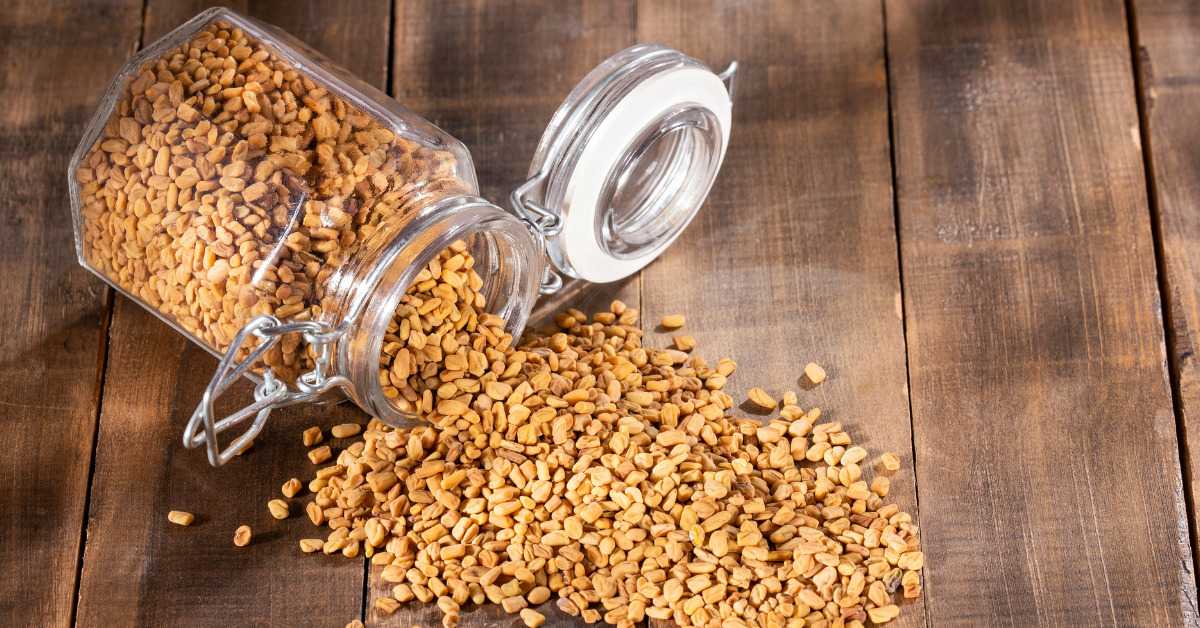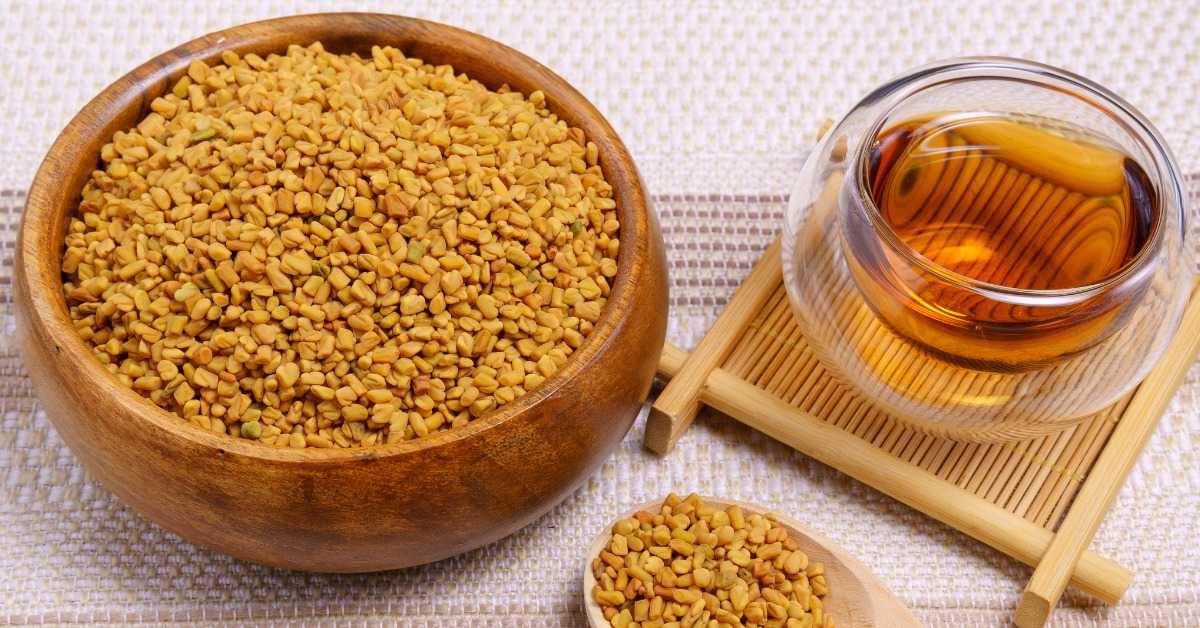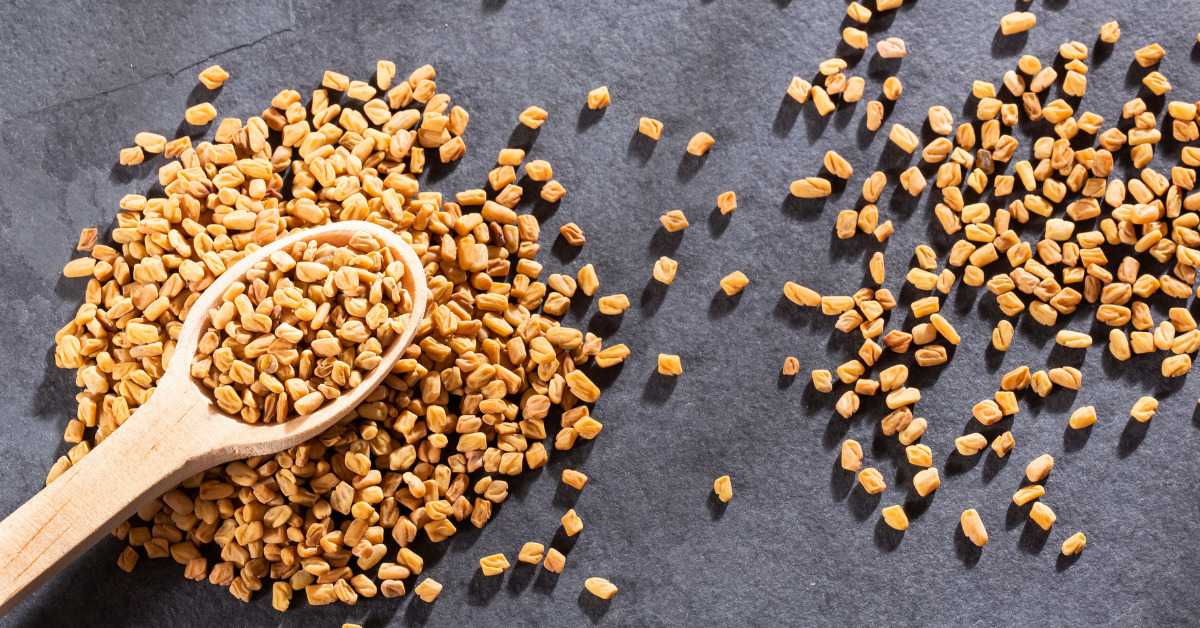From diabetics to heart patients, almost everyone is advised to consume bitter fenugreek seeds. If we look at the number of problems it is thought to cure, we might declare it a top-ranking superfood.
Fenugreek, also known as Methi Dana, is a popular Indian spice used as a supplement. It has a lot of health benefits, which is why you should include it in your diet. Let’s explore everything you need to know about this superfood!
Nutrition Facts
According to the US Department of Agriculture, one tablespoon of whole Methi Dana contains 35 calories and other nutrients:
- Carbs: 6 grams
- Protein: 3 grams
- Fiber: 3 grams
- Fat: 1 gram
- Iron: 20% of the Daily Value (DV)
- Magnesium: 5% of the DV
- Manganese: 7% of the DV
How to Take Fenugreek Seeds?
- Fenugreek is found in a variety of supplements. There is no single dose that is advised. The suggested dose varies depending on the supplement’s formulation. Furthermore, the dosage may differ based on the effect sought.
- Supplements should be consumed either before or after a meal.
- Because this herb helps reduce blood sugar, it’s recommended to take it with your day’s highest-carb meal.
- Always read the label for dosage directions.
- Consult your healthcare provider if you’re unsure. You can consult a dietitian anytime via Marham.pk.


Methi Dana Benefits
There is currently insufficient evidence to adequately support the use of Methi Dana in any medical setting. Fenugreek, on the other hand, has been used to cure a wide range of ailments for hundreds, if not thousands, of years in various forms, including:
- digestive problems, including loss of appetite, constipation, and gastritis
- breast milk production as well as flow
- low testosterone or libido
- diabetes
- menopause
- painful menstruation
- high blood pressure
- arthritis
- breathing problems
- obesity
- low exercise performance
- boils
- open wounds
- ulcers
- migraines and headaches
- childbirth pains
- muscle pain


Only a few of the stated health benefits of fenugreek have been well supported by scientific research. Fenugreek has been shown to have a variety of health advantages, including:
Improve Weight Loss
Fenugreek has been shown to suppress appetite and promote feelings of fullness, which may aid in weight loss by reducing overeating. According to a study on Methi Dana benefits, nine overweight female Korean volunteers received fennel, fenugreek, or placebo tea before lunch. Those who drank fenugreek tea said it made them feel less hungry and more satisfied. On the other hand, the tea did not affect the participants’ consumption.
Improve Milk Production and Flow
Might you be curious to know the fenugreek benefits for females? It can promote breast milk production and ease the flow and has long been suggested for this purpose by traditional Asian medical practitioners. A study was conducted on 25 new mothers who drank three cups of Methi Dana tea every day for two weeks and noticed an increase in breast milk volume in the first weeks. You may also read 8 top foods that increase breast milk production.
Raise Testosterone and Boost Sperm Count
Methi Dana may increase low testosterone and sperm levels. According to a study, 50 male participants were given a fenugreek seed extract to take for 12 weeks, and approximately 85% of the subjects had a higher sperm count. It also increased mental alertness, mood, and libido.
Reduce the Risk of Blood Pressure and Heart Conditions
Methi Dana may help manage cholesterol levels and blood pressure, lowering the risk of heart disease and improving overall heart health. This could be because fenugreek seeds contain about 48% dietary fiber. Dietary fiber is difficult to digest, and it forms a thick gel in the intestines that makes carbohydrates and fats more challenging to digest. If you have high blood pressure, just read 5 tips to control high blood pressure without medications.
Pain Relief
Methi Dana has long been utilized in traditional medicine for pain treatment. The herb’s alkaloids are thought to help block the sensory receptors that help the brain sense pain. According to the research, 51 women experiencing painful periods took Methi Dana powder capsules three times a day for two months for the first three days of their periods. Between the months, they had less pain and fewer symptoms.


Fenugreek Seeds Water
If you don’t use methi in your curries or vegetables, here’s an easy way to incorporate it into your daily diet. Drinking methi water is an excellent approach, and Methi or fenugreek water is simple to make at home. Here you go.
How To Prepare Fenugreek Seeds Water At Home?
- Place fenugreek seeds in a pan. Remove the seeds from the heat after they have been roasted.
- Place these seeds in a blender and process until finely ground.
- Mix 1 tsp Methi Dana powder into a glass of warm water.
Your glass of methi water is about to be filled. To get the most out of it, drink in the morning.
Benefits of fenugreek seeds soaked in water
- Methi water would keep you full for a long time. Methi is high in fiber, giving you a feeling of fullness. This aids with weight management. When you’re full, you don’t eat as many calories and are less likely to snack on unhealthy foods. It also helps to keep bloating away.
- Fenugreek seeds’ benefits for hair are numerous, including hair growth, improved hair volume, and the prevention of hair problems like dandruff and roughness.
- Fenugreek or methi water aids in the removal of harmful toxins from the body as well as the improvement of bowel movements. It aids in the treatment of digestive issues, including constipation, indigestion, and other digestive problems.
- People with diabetes benefit greatly from methi seeds. Methi aids in the regulation of blood sugar levels. Fenugreek seeds contain amino acid components that enhance insulin release in the pancreas, decreasing blood sugar levels in the body.
Other Health Benefits of Methi Dana
Fenugreek has long been used to cure a wide range of ailments. However, many of these applications have not been thoroughly investigated to conclude. A preliminary study suggests that fenugreek may help heartburn, skin problems, ulcerative colitis, and numerous other conditions.


Methi Dana Uses
Fenugreek extracts can be found in a variety of goods, including:
- soaps
- garam masala, a spice blend
- teas
- cosmetics
- imitation maple syrup products
- condiments
Adverse Effects of Methi Dana
Some of the common side effects of fenugreek are:
- diarrhea
- dizziness
- an upset stomach
- headaches
- the sweat, breast milk, or urine taking on a maple-like smell
Although rare, some people have developed adverse responses to fenugreek. It should be avoided by:
- Pregnant women contain chemicals that can increase contractions and cause congenital disabilities.
- Because fenugreek can mimic estrogen in the body, it may negatively influence patients who have hormone-sensitive malignancies.
- Fenugreek should be avoided or used with caution by anyone with a health problem. Before you attempt it, see a nutritionist.
Although fenugreek does not interact unfavorably with many pharmaceuticals, certain of the herb’s components may perform comparable roles to medications, making combining the two potentially dangerous. More research is needed to comprehend the dangers of fenugreek overdose fully. It’s better to gradually incorporate fenugreek into your diet, like with any therapeutic food or medication.
FAQs
1- Are there any fenugreek tea benefits?
Methi Dana tea is an old remedy for diabetes. It also increases milk supply in breastfeeding women.
2- Are there any side effects of methi dana?
Yes, as mentioned above, it can induce diarrhea, dizziness, headaches, an upset stomach, and a maple-like odor in the sweat, urine, or breast milk.
3- What happens if we drink methi water daily?
Methi is known for its antioxidant capabilities, and drinking methi water daily will cleanse your system and provide you with healthy, beautiful skin and strong hair.
4- What does fenugreek do for females?
It improves breast milk production and flow.
Book an appointment now, to answer all your queries. You can book an appointment with the top Nutritionists in Pakistan through Marham by calling at Marham helpline: 0311-1222398 or by online booking facility through the website or Marham mobile app.
Can’t Find The App?
Android Users:
https://play.google.com/store/apps/details?id=controllers.marham.marhammed&hl=en
Drop a review for us at Playstore if you’ve had a good experience!
iPhone Users:
https://apps.apple.com/pk/app/marham-find-a-doctor/id1095243102
Stay Home. Stay Safe!

